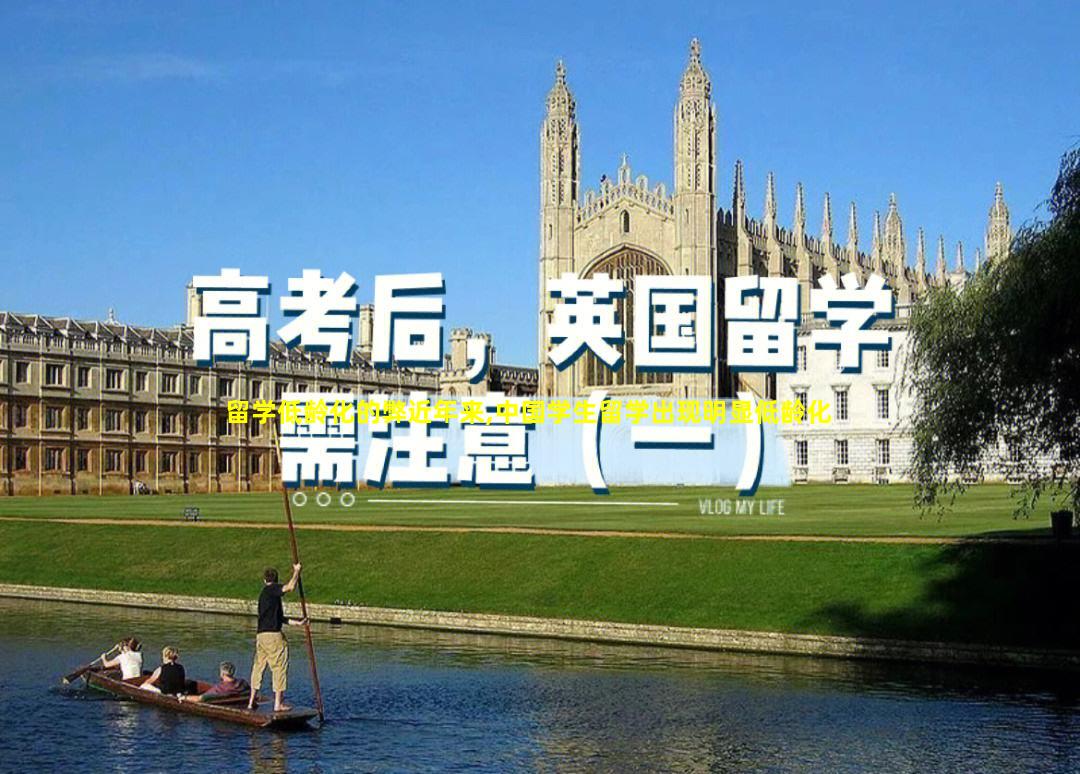 锦泰留学网
锦泰留学网
留学低龄化是指越来越多的年轻学生选择在较低的年龄阶段就去国外留学。尽管留学低龄化有一些好处,例如提供了更早接触国际教育的机会,但也存在一些弊端。
留学低龄化可能导致学生面临很大的压力。年轻的孩子可能还没有足够的心理准备和适应能力来应对新的环境、文化和教育体系。他们可能会感到孤独、焦虑和无法适应。他们还需要独自面对学习压力和学业要求。
留学低龄化可能会对学生的发展产生不利影响。留学期间,学生可能错过了与家人和同龄人共同成长的机会。他们可能无法建立深厚的家庭关系和朋友圈,缺乏社交和情感支持。提前留学可能会限制学生在本土教育系统下接受全面的教育,可能无法获得足够的知识、技能和经验来应对将来的挑战。
留学低龄化还可能对学生的身心健康造成影响。长期生活在陌生的环境中,面临文化差异和语言障碍,可能给学生带来压力和焦虑,增加身心健康问题的风险。
尽管留学低龄化提供了一些机会,但也存在一些弊端。决定是否留学要综合考虑学生的个人发展和适应能力,以及家庭和社会的支持和资源。
近年来,中国学生留学出现明显低龄化的趋势。越来越多的中国家庭选择将他们的孩子送出国留学,有些甚至是在高中阶段就出国。这种现象的主要原因可以归结为以下几点:
1. 经济实力的提升:随着中国经济的快速发展,越来越多的家庭有能力承担孩子的留学费用。这使得更多的家庭能够在孩子较小的年龄就开始考虑将他们送出国留学。
2. 教育竞争的压力:中国教育系统的竞争非常激烈,孩子们需要面对高强度的学习压力和激烈的竞争环境。一些家长希望通过将孩子送出国留学,给他们提供更好的教育资源和更宽广的发展空间,帮助他们在全球化的竞争中脱颖而出。
3. 语言能力和跨文化经验的培养:学习英语是中国学生的一项重要任务。通过出国留学,学生们可以更好地提升语言能力,并且有机会接触不同的文化和思维方式,从而培养跨文化的交流和应变能力。
这种低龄化的留学趋势也存在一些问题和挑战。一些学生在较小的年龄就离开家庭、朋友和熟悉的环境,可能面临适应困难和心理压力。同时,家长们也需要慎重考虑留学的目的和风险,并提供必要的关爱和支持,确保孩子的健康和全面发展。
With the increasing globalization and the opening up of education systems, more and more students are choosing to pursue their education abroad at a younger age. This trend of studying abroad at a low age, commonly known as "留学低龄化" in Chinese, has its advantages and disadvantages.
One of the benefits of studying abroad at a young age is the opportunity for early language acquisition. Being exposed to a foreign language early on allows students to develop language skills more easily and naturally. This can be advantageous in the future, as fluency in multiple languages is increasingly valued in the job market. Furthermore, studying abroad at a young age exposes students to different cultures, enhancing their cross-cultural understanding and promoting global citizenship.
Another advantage of low-age study abroad is the opportunity for a better education system. Some countries offer more advanced and specialized education programs compared to the students' home country. Studying abroad at a young age allows students to access these high-quality education systems and gain a competitive edge in their academic pursuits.
However, there are also drawbacks to low-age study abroad. One major concern is the emotional and social development of young students. Studying abroad at a young age involves leaving behind family and friends in their home country, which can lead to feelings of homesickness and loneliness. Additionally, adapting to a new school system and making new friends in a foreign country can be challenging for young students, potentially impacting their social well-being.
Another disadvantage is the financial burden placed on families. Studying abroad at a young age often requires significant financial investment, including tuition fees, accommodation, and living expenses. Not all families can afford this cost, which may restrict the opportunities for low-income students to pursue their education abroad.
In conclusion, there are both advantages and disadvantages to low-age study abroad. While it provides opportunities for language acquisition, exposure to different cultures, and access to better education systems, it also poses challenges in terms of emotional and social development and financial constraints. Ultimately, the decision to study abroad at a young age should be based on careful consideration of individual circumstances, taking into account both the benefits and drawbacks.
偶像低龄化是指偶像产业中出现年龄较小的偶像,并专门面向青少年市场进行推广和宣传。这一现象在近年来的流行文化中日益普遍,带来了一系列利与弊。
利:
1. 满足青少年需求:偶像低龄化能够更好地满足青少年对于与自己年龄相近、有共鸣的偶像的需求,增强他们的情感认同感。
2. 激发梦想与追求:年轻偶像的成功经历和励志故事,可以激发更多年轻人的梦想和追求,鼓励他们努力奋斗,追求自己的理想。
3. 创造经济效益:偶像低龄化产业推动了相关商品的销售,带动了娱乐产业的发展,为经济注入了新的活力。
弊:
1. 儿童权益保护:偶像低龄化可能使年幼的孩子过早地接触商业化,可能会导致过度的竞争压力、心理健康问题等,需要加强儿童权益保护。
2. 教育价值边缘化:偶像低龄化过程中,可能会出现过度包装和艺人形象化的现象,使一些负面的价值观得以传递,对于青少年的价值观发展产生不利影响。
3. 影响学业与交往:过度追求偶像的青少年可能会忽视学业,对人际交往造成影响。同时,歌迷群体的过度崇拜可能导致一些问题,如粉丝暴力等。
偶像低龄化既带来了一些积极的影响,如满足青少年需求、激发梦想和创造经济效益,也存在一些负面的影响,如儿童权益保护、教育价值边缘化和影响学业与交往。因此,在推动偶像低龄化的同时,应加强相关的监管与指导,确保青少年能够健康地参与并受益于偶像文化。